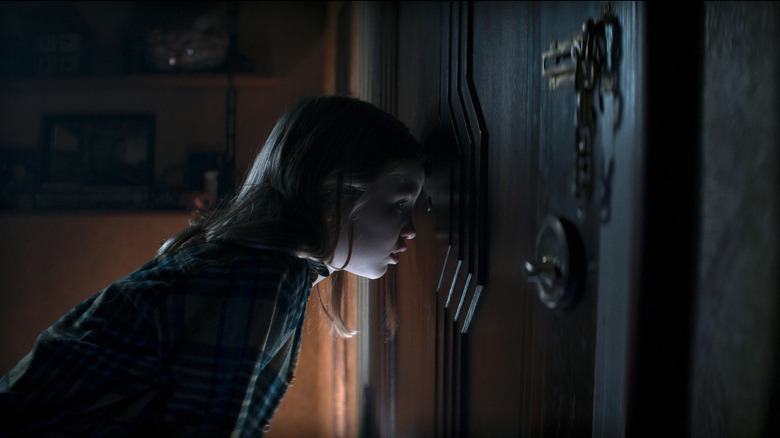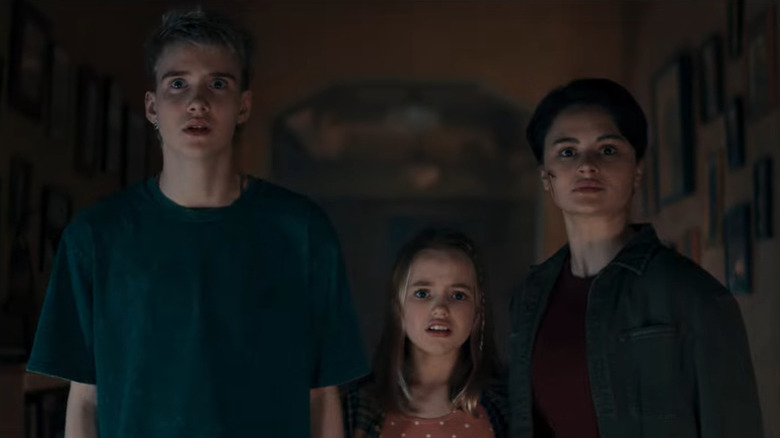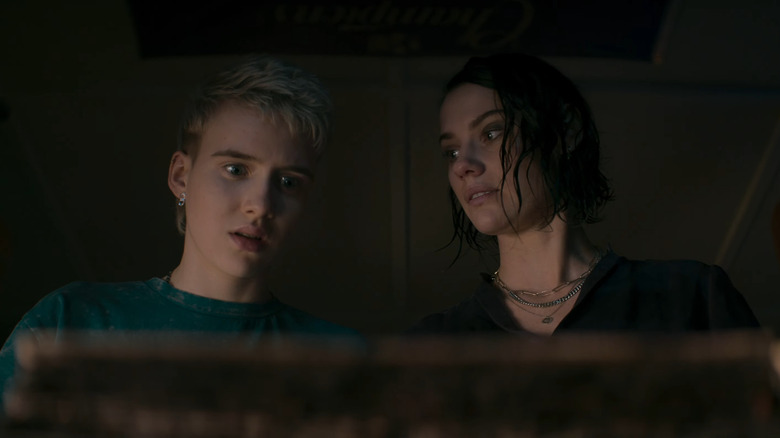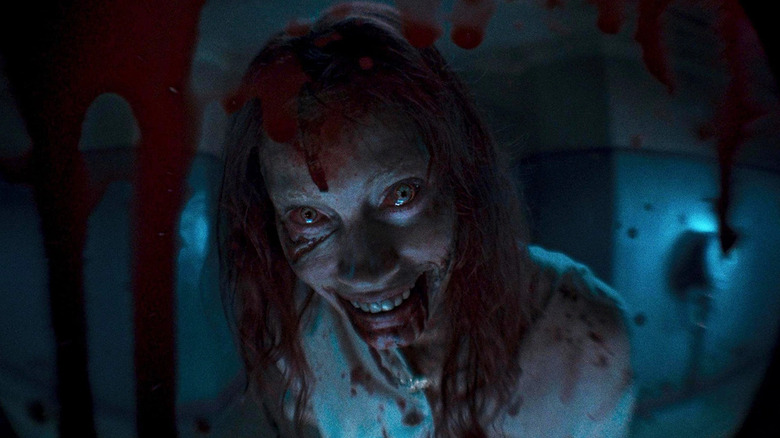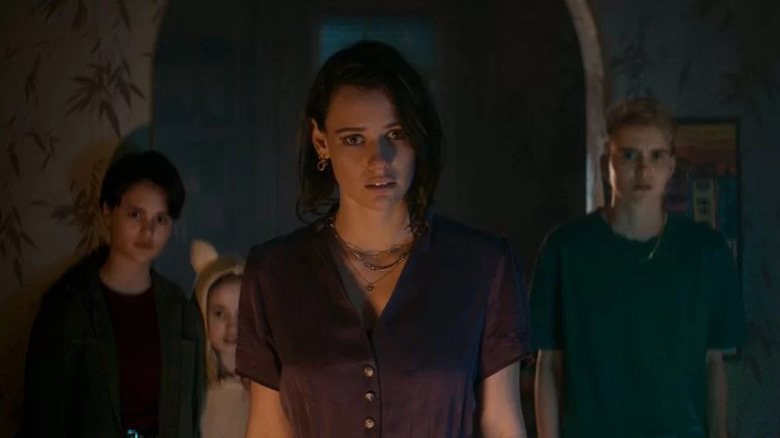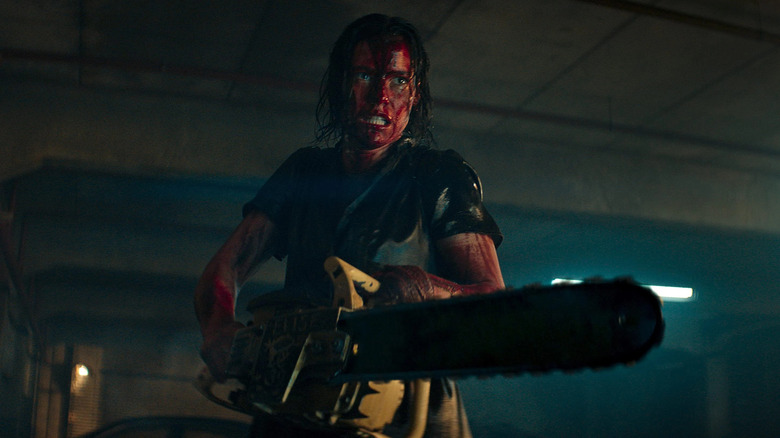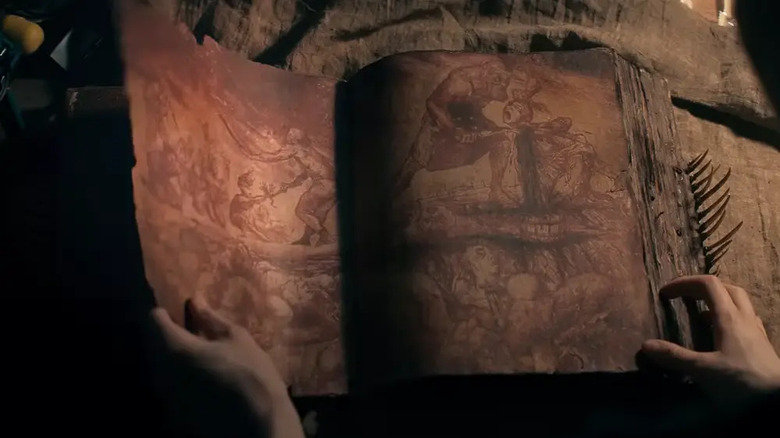Evil Dead Rise Ending Explained: Coming Around Again
This article contains massive spoilers for "Evil Dead Rise."
As much as we humans love to champion our capacity for free will, life is inevitably made up of events that occur without our intent, and beyond our control. We can all attempt to make a plan for how our lives will go, but in the end, living is as much reacting as it is acting.
These seismic events that change the course of one's life don't necessarily have to be traumatic. For those in the "Evil Dead" universe, however, trauma is an unfortunately perennial thing. The latest installment of the franchise, "Evil Dead Rise," sees writer/director Lee Cronin soft-reboot the series yet again after 2013's "Evil Dead" and the 2015-18 TV series "Ash vs Evil Dead." This too is par for the course: one could argue that, despite numerous bits of connective tissue, every "Evil Dead" film contains a little continuity rebooting. Like sudden, unwanted tragedy in real life, the Book of the Dead just keeps cropping up, wreaking havoc on a new set of unsuspecting innocents.
The cyclical nature of evil brought on by the Naturom Demonto isn't merely metatextual, as Cronin bakes the theme into the movie's text and structure itself. "Evil Dead Rise" also complements that theme with the concept of motherhood: even if one chooses to bear children, the reality of raising kids is something few are adequately prepared for at the beginning. Whether dealing with little monsters or capital-M Monsters, life throws you curveballs, and it's either going to be you or the proverbial Deadites which rise to the occasion.
The end is the beginning is the end
In a cheeky move, the opening scenes of "Evil Dead Rise" are actually, chronologically, the end. During an idyllic trip to a cabin by a lake presumably somewhere in California, Teresa (Mirabai Pease) is attempting to read Emily Brontë's "Wuthering Heights" but is rudely interrupted by her friend's new boyfriend, Caleb (Richard Crouchley), and his camera drone. Annoyed, Teresa goes to check on her friend, Jessica (Anna-Maree Thomas), who hasn't been feeling well since the trio arrived at the eerily triangular-shaped cabin in the woods.
Turns out that no amount of pills or rest will help what ails Jessica, who begins reciting the exact text of "Wuthering Heights" at the precise point Teresa is reading them, a nod to the possessed Cheryl (Ellen Sandweiss) psychically calling out playing cards she can't see in 1981's "The Evil Dead." After convulsing and spewing up disturbingly pale vomit (another nod to "The Evil Dead," which used a milk-like substance as one of many Deadite fluids), Jessica appears to die, then opens her eyes and tears off Teresa's scalp.
Heading out to the dock by the lake, a fully-possessed Jessica attacks Caleb and then appears to drown in the lake. Caleb dutifully attempts to rescue his girlfriend but finds his head separated from his body in the process. As a bleeding, disfigured, and disoriented Teresa watches helplessly, Jessica rises from the lake, hovering above it, the demon inside her unleashed. How this happened, however, is unclear, as there's no Book of the Dead or recordings of someone reciting the book's passages laying about.
Whose vault is it, anyway?
One day earlier, Beth (Lily Sullivan), a nomadic guitar technician, arrives unannounced at the Los Angeles apartment of her sister, Ellie (Alyssa Sutherland). Beth is there to discuss her latest predicament in finding herself pregnant, yet quickly becomes aware that Ellie is dealing with a heap of her own problems. In addition to trying to make a living as a tattoo artist, Ellie's raising her children Bridget (Gabrielle Echols), Danny (Morgan Davies), and Kassie (Nell Fisher) without the benefit of a partner, as her husband left several months ago. To make matters worse, the high-rise apartment building that the foursome lives in is due to be demolished in just a month's time, with the family yet to find a new place to live. Although Beth is hurt by Ellie's belief that she's a glorified groupie, her selfish ignorance of Ellie's attempts to reach out to her cuts both sisters in a deeper way.
Sent to get some pizza while the sisters attempt to talk things out, the kids find themselves trapped in the building's parking garage when a massive earthquake occurs, causing the ground to break open and the pizza to be ruined. That pizza, by the way, is from a place called Henrietta's Pizza, a reference to the chief Deadite from "Evil Dead II." The place's motto is "Come Get Some," which is both a reference to a famous one-liner Ash (Bruce Campbell) utters in "Army of Darkness" as well as a setup for later.
Speaking of references, Danny is drawn to a new Hole in the Ground, discovering an old bank vault preserved below the building. Ignoring ominous elements like hundreds of crosses and creepy bugs, Danny finds a mysterious book along with several vinyl records, stealing them from the vault.
Children shouldn't play with (evil) dead things
Since their mother is often busy, the kids all have their own individual hobbies: Kassie constructs bizarre toys like the stick-with-a-doll's-head-on-it that she's dubbed "Staffanie," Bridget is an avid activist, and Danny is an aspiring DJ. Enamored with the mysterious book, Danny unwittingly drops some blood on it after cutting his finger on the teeth that act as a clasp, opening the book up and revealing some very disturbing illustrations. Despite Bridget's warnings, Danny decides to play the records he found, discovering that they belonged to a few rogue priests in the early 20th century who foolishly believed that studying the Naturom Demonto could lead to helping the fight against evil. As one priest begins to recite the demon resurrection passages from the book, the record player freezes into place, and Danny is helpless to stop the evil from being unleashed.
Ellie becomes the evil's first victim, attacked in the building's elevator in a manner reminiscent of Cheryl's attack by tree vines in the first film (as well as Bobbie Joe [Kassie Wesley] in "Evil Dead II" and Mia [Jane Levy] in "Evil Dead" suffering similar ordeals). Similar to Jessica at the beginning of the movie, Ellie returns to the apartment spewing white vomit and is only able to get out a plea to Beth to save her children before dying.
Beth reaches out to the floor's handful of neighbors for assistance but discovers that the building's elevator is out of order and the stairs have been destroyed during the quake (much like the bridge across the river being mysteriously totaled in prior "Evil Dead" films). Just as a discussion starts about trying to reach a fire escape across a vacant apartment, Ellie reawakens, and the possessed woman begins attacking her family.
Demons, too
After Ellie is possessed, Cronin and "Evil Dead Rise" begin attacking the audience as well as the characters. Even the score by composer Stephen McKeon includes "something offscreen laughing and delighting at the terror of the characters," as the composer recorded "two female vocalists performing 'taunting' sounds and vocal effects" as he described in the film's official press notes. No member of the family is safe from violence let alone possession, and as per "Evil Dead" tradition, the Deadite attacks are emotionally as well as physically damaging.
In addition to the numerous references to the "Evil Dead" franchise peppered throughout, "Evil Dead Rise" pays homage to Stanley Kubrick's "The Shining" in ways both obvious (a low angle shot of Beth, an elevator filled with blood gushing forth) and subtle, as that movie also concerns a parent driven murderously insane. There is also a sequence seen mostly through Ellie's apartment peephole where the demonic woman murders the rest of the floor's neighbors that is arguably the tensest peephole scene since Dario Argento's "Opera," and a few elements of the film even seem akin to another Sam Raimi feature, 1985's "Crimewave." The premise of innocent victims trapped inside an apartment building with murderous people allows the movie to belong to the subgenre of High-Rise Horror, a group which includes the likes of Lamberto Bava's "Demons 2," the opening of George A. Romero's "Dawn of the Dead," David Cronenberg's "Shivers," Jaume Balagueró and Paco Plaza's "[REC]," and Ben Wheatley's aptly-titled "High-Rise."
The Cosmic Horror of the "Evil Dead" series is most prominent, however, especially when Beth discovers via the last of the vinyl recordings that there is no way to destroy the book nor dispel the evil; all one can do is run.
The family that slays together, stays together
After Bridget and Danny also die and become possessed, Beth disables Ellie with a couple of blasts from a neighbor's shotgun. Finding their route to the fire escape cut off, Beth and Kassie brave the elevator, resulting in a harrowing and bloody trip to the parking garage. Meanwhile, Demon Ellie employs the assistance of her possessed children, bringing them to her aid as their bodies merge into a new, even more unholy being: the Marauder.
It's with this creature that "Evil Dead Rise" honors the franchise's latent Lovecraftian origins — the Marauder is akin to a Cthulhu with many limbs instead of tentacles, the monster resembling something seen in the "Resident Evil" game series — as well as makes explicit what was once subtextual. In addition to the film being partially inspired by the worldwide wave of lockdowns and shelter-in-place during the COVID pandemic, it's also a story of the toxicity of evil subverting and perverting a family's love for each other. The possessed Bridget and Danny aren't so much helping Ellie as becoming simply an extension of her, the mother twisting the concepts of protection and love into this new, abhorrent, murderous being.
Of course, Ellie is still verbally abusive to her sister during their final confrontation, reminding Beth of how she resembles their own mother (not in a complimentary way) and throwing the term "groupie" at her insultingly after attempting to kill the baby inside her earlier. When the Marauder abducts Kassie just as the girl and Beth are about to escape through the building's main gate, Beth is forced to make her biggest choice.
Getting some closure
Earlier, when Kassie asked about Beth's pregnancy — "Are you going to be a mom?," she says pointedly — Beth unequivocally answered "Yes." Finally, Beth gets the chance to prove all aspects of that statement, refusing to run away when she easily could, especially against the advice of the priest on the record.
Getting a hold of a neighbor's chainsaw, Beth gets to deliver the line "Come get some," partially because she'd probably seen it on a pizza box before, and partially because this is the "Evil Dead" universe seeing events echo each other across timelines. With Kassie's help, Beth is able to destroy the now toxic members of her family, pushing the Marauder's body into some landscaping equipment and grinding it to bits. The Marauder represents the latest creature that acts as a sort of video game final boss in the "Evil Dead" universe: previously, there was the manifestation of the Evil Force in "Evil Dead II," the Abomination in "Evil Dead," and various Big Bads within "Ash vs Evil Dead," including The Dark Ones and Kandar the Destroyer, a kaiju-like monster.
With their own personal demons vanquished, Beth and Kassie finally leave the apartment building. As Beth makes a point of going back to collect the chainsaw to take on their journey, it's clear that she's embraced her own maternal instincts, committing to protecting her niece as well as keeping her unborn child.
What comes around, goes around
Yet as the priest on the recording said, there's no dispelling the evil once it has been unleashed. That's the unfortunate discovery of Jessica, who it turns out is also a resident within Ellie's doomed apartment building. Somewhat lucky for the girl, she lives on the 5th floor, below where the stairway had been destroyed during the earthquake.
Cheerfully ambling down the stairs while convincing her wary friend Teresa to join her and her boyfriend for a vacation by the lake, she reaches the parking garage and takes a little while before noticing the evidence of bloody carnage around her. Panicking at the sight of it, she attempts to call for help, but it's too late — the evil force surrounds her, and makes a beeline for her throat just as it did Ash's at the finale of "The Evil Dead."
Of course, we already know Jessica's ultimate fate, since we saw it occur at the beginning of the film. "Evil Dead Rise," then, is a closed loop of a movie, an ouroboros of blood, dread, and terror. It's also, cleverly, open-ended: one can assume that Teresa does not survive that day at the lake, but who knows what the possessed Jessica did next or where she may have gotten to. In the "Evil Dead" universe, everything seems to come back around sooner or later: a cabin in the woods, a clock, a book, a recording.
When life hands you such hardship, you can either step up and take responsibility like Beth, or, as Ash once colorfully and appropriately put it, "run home and cry to Mama."
